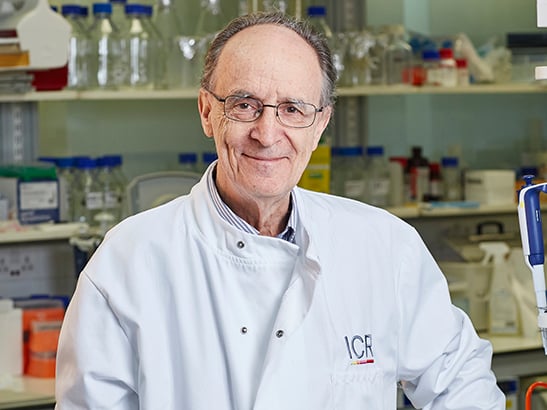
Professor Greaves, or Sir Mel, as he can now be known, has carried out groundbreaking work to understand the hidden natural history and causes of childhood leukaemia during a 35-year career at The Institute of Cancer Research, London – leading to advances in diagnosis, treatment and potentially prevention.
He has also been a pioneer in identifying that cancers undergo a form of Darwinian evolution that leads to drug resistance – an insight which has opened up an exciting new field of cancer research and treatment.
Professor Greaves is now raising money for a new research programme designed to test whether childhood leukaemia can indeed be prevented.
Our latest research shows that within the next decade, we can make acute lymphoblastic leukaemia preventable. Your support will help us make this disease a thing of the past.
Pioneering methods
Professor Greaves’s knighthood for services to children’s leukaemia research comes after his receipt of the Royal Society’s prestigious Royal Medal in 2017 – following in the footsteps of previous pre-eminent winners including Charles Darwin, Michael Faraday and Francis Crick.
Inspired by visits to an Italian hospital and Great Ormond Street Hospital in London in the 1970s, where he met children with leukaemia, Professor Greaves became compelled to understand how and why the disease develops in otherwise healthy children.
He was also a pioneer in introducing the concept that cancers progress and become more malignant and drug resistant through a process equivalent to the evolution of species by natural selection.
Additionally, he developed the novel insight that vulnerability to many common cancers including childhood leukaemia, breast cancer and skin cancer reflects mismatches between our evolutionary, historical adaptations and our contemporary lifestyles.
By studying identical twins with leukaemia and archived blood samples from newborn babies, in the 1990s, Professor Greaves’s lab at the ICR uncovered the mutational changes that trigger childhood leukaemia in utero.
He gradually built up evidence showing that the disease is caused through a covert, two-step process of genetic mutation and exposure to infection.
The first step involves a genetic mutation that occurs in the foetus and predisposes children to leukaemia – but only 1 per cent of those born with this genetic change go on to develop the disease.
The second step is a trigger later in childhood by exposure to one or more common infections, but primarily in children who experienced 'clean' childhoods in the first year of life, without much interaction with other infants or older children.
'I am extremely grateful for the honour'
Professor Greaves is now taking part in a major fundraising appeal seeking support for the next stage in his research, where he aims to see if leukaemia can be prevented.
The New Year’s Honours list is announced by the Cabinet Office and consists of a range of honours for people from a wide variety of walks of life.
Professor Sir Mel Greaves, who is Director of the Centre for Evolution and Cancer at The Institute of Cancer Research, London, said:
“I am honoured, delighted and somewhat bewildered to have received this honour. When I started out in cancer research my aim was only ever to understand what was causing leukaemia in children and how this new knowledge could make their lives better.
“It has been a wonderful journey over the last 40 years since I first started studying leukaemia, and I feel very privileged to have been able to contribute towards the unpicking of this once mysterious and lethal disease.
“To gain a knighthood was never remotely in my sights, but I am extremely grateful for the honour and hope it can inspire my many young colleagues as they also look to push back the boundaries of cancer research.”
Inspiring cancer researchers across the world
Professor Paul Workman, Chief Executive of the ICR, said:
“Everyone at the ICR is incredibly proud of Mel for this thoroughly well-deserved honour, and more importantly for the lifetime of pioneering cancer research which has earned it.
“Mel’s breakthroughs have helped transform our understanding of how childhood leukaemia develops and how it is treated, and the next stage of his research has the potential to turn it into a preventable disease.”
“We also have to thank Mel for inspiring cancer researchers across the world to look at cancer from an evolutionary perspective. This approach has transformed the way we think about cancer, and is inspiring us to create a new generation of anti-evolution treatments with the potential to overcome drug resistance.”
